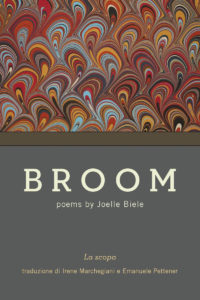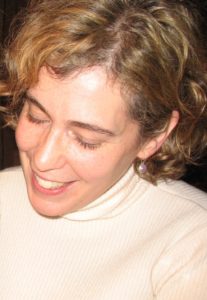Review by Barbara Harroun
Joelle Biele’s Broom, recipient of the 2013 Bordighera Poetry Prize, studies life with such microscopic precision and attention that the daily cracks open as wondrous, perplexing, and miraculous. The poems, printed in English and translated into Italian on the mirrored page, gave me new eyes, new occasions to see, and lenses with which to reflect on the life I bring with me to the page. Devoid of sentimentality, these poems inquire into the webbed experiences of navigation—navigating motherhood and writing and traveling and illness and remission and the natural world. Biele’s rich imagery, diction devoid of sentimentality, her ability to revel in form (from sonnets to the ghazal, to a sestina so well executed I only caught it on the second read), and the intimacy she evokes in the epistolary poems to her children, make her a poet to celebrate in all languages. This is a collection to read and reread, carry with you, and carry out into the world.
In an interview with Balancing the Tides: Motherhood and the Arts, Biele states, “For me, writing about the experience of mothering is a feminist act. Women must define it for themselves; otherwise it will be defined for them.” Biele does just that—revealing, investigating, and celebrating the complex nuance of daily life as a woman. Her poems were revelatory to me, especially the ones in which she writes to and observes her children while conveying her own rich experience. In “To Katherine: At Twenty Months” Biele concludes
My million-bells, my sweet potato vine,
you who love the dandelion above all others,
you stoop to its bright face, its tiny hooks
and ferocious mane, lift up your head and roar. (46)
This exuberant language and imagery is juxtaposed by the deep, nearly tangible quiet and contemplation of “To Andrew: At Four Weeks.” The poem opens with striking imagery:
The barn doors yawn into the night
and two tall pines hang their hats
on the moon and you sleep your milky sleep
while the pond swirls the clouds
like a new spoon.
But Biele artfully leaps into that quiet to ask
…as if your heart
never whirred like a bird’s and your body
never heaved into the bloody light
and your mouth never let out that filmy cry
when you sank into my arms. Where does
a birth like that go? (50)
Biele gets at the universes contained within the complexity of motherhood; from the deep blood-love of our children, the bearing witness to their complex humanity and coming to know the world, the acquisition of coordination and language, and the truth we carry as parents regarding our fragile bodies and fragile world. Biele captures the braided joy and suffering, deep knowing and teetering uncertainty, places where we are rooted and those we explore.
Biele’s first collection, White Summer, won the Crab Orchard Review’s First Book Series Award in 2001. She’s traveled to Poland and Germany as a Fulbright Professor and taught Creative Writing and American Literature at John Hopkins University, the University of Maryland and is the editor of Elizabeth Bishop and The New Yorker: The Complete Correspondence. Biele has garnered awards from the Maryland State Arts Council and the Poetry Society of America and rightfully so. Her essays and fiction can be found in heavy hitters like American Poetry Review, Antioch Review, Black Warrior Review, and New England Review to name a few, and after reading “The Field” an essay that comprises the third section of the book, I understood why. “The Field” focuses on place—first the field in which Kristy is found, then the town Beile rode her bike through, and how place is transformed in light of the murder of a classmate, Kristy Miller. It is also a reflection on childhood as a place we remember, and as a landscape that has been vastly transformed and fenced in for our own children. Biele reflects
When I think of my childhood what comes back is not a particular time or place but a feeling of speed and buoyancy, that roar in my ears, the cool on my skin, the kind of revved-up happiness that I have, for better or worse, sought to recreate off and on my entire adult life. (74)
Biele, whether it is the three sections of sublime poetry, or her sculpted nonfiction, offers us a microscope to climb through. She’ll show us the worlds within our own world, remind us that every day transformation is occurring, life is exploding and perhaps receding too—and it’s all poetry.
Broom
by Joelle Biele
Translated by Irene Marchegiani and Emanuele Pettener
Bordighera Press, 2014, $10.00 [paper]
ISBN 9781599540856
Barbara Harroun is an Assistant Professor at Western Illinois University. Her most recent work is forthcoming or appearing in Fiction Southeast, Watershed Review, Rappahannock Review and Iron Horse Literary Review. Her favorite creative endeavors are her awesome kids, Annaleigh and Jack. When she isn’t writing, reading, or teaching, she can be found walking her beloved dog, Banjo, or engaging in literacy activism and radical optimism. She can be found at barbaraharroun.com.


